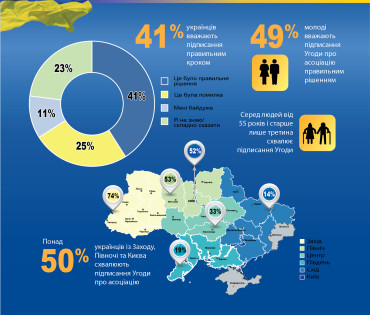The results of the opinion poll, conducted by GfK Ukraine on request of the Institute ofWorld Policy.Answering the question, what should the Ukrainian government do, if the EU does not offer the prospect of membership to Ukraine in the nearest future, almost half of the respondents have unanimously given priority to reforms. 46% of them have chosen the “they have to carry out the reforms first, and only then to talk about EU membership” option.
16% believe that Ukrainians need to rely only on themselves, having chosen the “Ukraine should not ally with anyone” option. The integration to the Eurasian Union and the NATO have received similar level of support, 6%. Another 7% have chosen the option “Ukraine should not enter the EU, as the EU is going to split anyway,” 1% have selected “other,” and every fifth respondent (21%) could not decide.
{3}
It should be noted that only 9% of elderly Ukrainians believe that in the case of failure of negotiations with the EU, Ukraine should join the Eurasian Union. Among the elderly people, there is the highest number of supporters of isolation – 18%; on the other hand, this age group also has the most of those who could not answer, every fourth respondent. The younger pollees are the most devote supporters of the “first reforms, and then accession” strategy. Every second respondent aged 18 to 34 have chosen this option for Ukraine.
In terms of regions, over a half of Ukrainians in Western (58%) and Northern (51%) regions, and in Kyiv (56%) demand reforms above all. In Central regions, the rate is relatively lower, 42%, with a significant number of those who could not answer, 25%. In Southern and Eastern regions, 36% and 34% of the pollees respectively have expressed demand for urgent reforms. It should be noted that Southern regions have shown significantly smaller percentage of those who could not answer, only 17%. Every fifth inhabitant of Southern regions (23%) believes that Ukraine should not join any alliance, which is the highest rate among all regions. Moreover, the South has the most of those who believe that Ukraine should not join the EU, since it is going to split anyway (13%).
Answering the question, was it right to sign the Association Agreement with the EU, 41% of respondents have answered “yes,” 25% have claimed that it was a mistake, 11% have chosen the option “I don’t care,” and 23% “don’t know.”
{1}
The highest rate of support for the Agreement has been demonstrated by younger (49%) and middle-aged (45%) respondents, the lowest by elderly pollees (31% of persons aged 65 and older). Men have declared their support for the Agreement more frequently than women (48% compared to 36%), while women have shown a high percentage for “don’t know” option, 26%.
The greatest support for signing the Agreement is observed in Western (74%) and Northern regions (53%), and in Kyiv (52%), with the smallest percentage of supporters in the East (14%) and South (19%). In Central Ukraine, there is the lowest gap between supporters and opponents of that step, 33% and 22% respectively. These regions also have the most of those who could not answer: 34% of respondents in Southern and Eastern regions the “don’t know” option has been chosen by 26% and 29% respectively.
The last question offered to the respondents was “when do you expect to feel the benefits of the Association Agreement with the EU?” 23% of the pollees have claimed that they expect to feel the positive effects of the Agreement within the next 5 years. 14% were less optimistic, selecting the “next 10 years” option, while 19% expect only negative consequences. 1% have already felt the benefits, and 9% expect to feel it within the next year.
However, over a third of respondents (33%) have answered that they do not know. In Western Ukraine and in Kyiv, every fourth pollee (25% and 26% respectively) does not know when the positive effects of the Agreement will reach them. In Central, Southern, and Northern Ukraine, this rate is 35%, and in Eastern regions it is 45%.
{2}
The highest percentage of those who expect to feel the benefits of the Agreement within the next 5 years, lives in the Western regions and Kyiv (38%). In other regions, there are significantly less optimists, from 19% in the North to 7% in the East. 36% and 40% of the residents of Southern and Eastern regions respectively believe that the Agreement will bring only negative consequences.
The survey was conducted by GfK Ukraine and based in personal interviews. The survey had involved 2,000 persons aged 16 and older from all regions of Ukraine except Crimea. In Donetsk and Luhansk regions, the survey has been conducted only on the territories controlled by Ukraine. The sample is representative by gender, age, region, and settlement size. The survey was conducted from March 29 to April 17, 2016. Margin of sample error is 2,2%.
The survey of public opinion is a part of “New European Policy: Filling the Awareness Gap” project supported by “Ukraine National Initiatives to Enhance Reforms” (UNITER) project, funded by the U.S. Agency for International Development (USAID) and implemented by the Pact in Ukraine.




Comments theme
Comments themeComments themeComments themeComments themeComments themeComments themeComments themeComments themeComments themeComments themeComments themeComments themeComments themeComments themeComments themeComments themeComments themeComments themeComments themeComments.